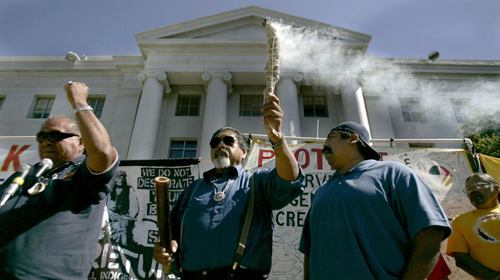The past five hundred years of ongoing colonization in America has typically been described in terms of physical violence and assimilation, however it is the epistemic erasure that I wish to focus on in this post. A critical component of assimilation is an epistemic amnesia. In other words, to erase Native American theories of knowledge and effectively strip them of any agency or sovereignty. If one sees assimilation in this light, as an act of “stealing,” then Native theories of knowledge are something worth including in discourses of repatriation.
While no law can be enacted to return everything that was stolen, NAGPRA (Native American Graves Protection and Repatriation Act) certainly opens the door to repatriation of physical objects as well as the implicit repatriation of Native American knowledge. Perhaps the best example of how knowledge can be repatriated is in American colleges and universities. Not only do many of these institutions hold vast collections of Native artifacts and bodies, but they also hold possession over Native American knowledge. As Bronwyn Fredericks (Indigenous Australian) posits, indigenous peoples are still considered “objects” (as opposed to subjects) of the academy in the way that they are studied and how their voices are marginalized:
Personally, even though I know that our experiences as Indigenous people within universities often reflect the experiences we have as Indigenous people in broader society, I still get surprised and angry when it is other academics who espouse notions of justice and equity with whom we experience tension and conflict in asserting our rights and cultural values. (Fredericks, 3)

Fredericks’ objections to the systemic racism within global academia urges us, as ethical scholars, to consider our how our way of study serves to empower or dominate Native voices. Moreover, we are challenged to investigate how our own methodologies can assume power over Native theories of knowledge, often unknowingly, in seemingly benevolent ways.
It is with this great sense of caution and sense of positionality that Fine-Dare approached the NAGPRA process at Fort Lewis College. She conducted the process in a way that privileged Native voices within the oppressive context of a research institution. Many of the Native consultants, who were present to identify objects for repatriation, expressed a desire to repatriate knowledge as well:
There was also general agreement that Native peoples’ knowledge should be solicited more often when curricular materials dealing with Native peoples were taught and archaeological and ethnographic programs planned. This knowledge should not be of a sacred or religious nature, however, but of a practical nature, such as that concerning agriculture or architecture. (Fine-Dare, Ch 4)
Sentiments like this demonstrate how the unfettered acquisition of Native knowledge can be construed as appropriation. If the discipline is committed to decolonization, then a necessary step to shifting its historically oppressive power dynamics would include recentering the study on Native voices and effectively repatriating power and control of Native epistemologies to Native peoples themselves. With this in mind, I challenge us, as a class, to consider the inherent power and privilege we possess in studying Native American issues from an academic perspective and use that knowledge to further decolonize academia.
Further Reading:
http://www.acrawsa.org.au/files/ejournalfiles/250Fredericks2014210.pdf
http://epress.lib.uts.edu.au/journals/index.php/csrj/article/view/2035/2212
Images:
http://www.andrewsmithgallery.com/exhibitions/larrymcneil/
http://www.senaahq.bravehost.com/UCBerkeley/BonesOfContention.htm
